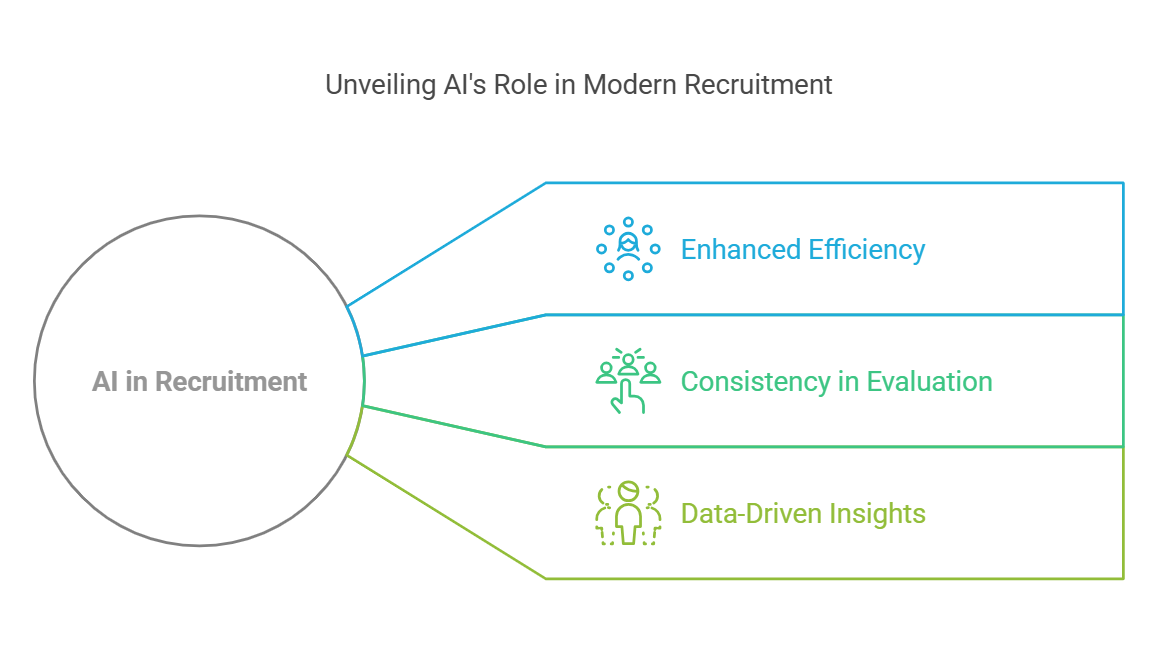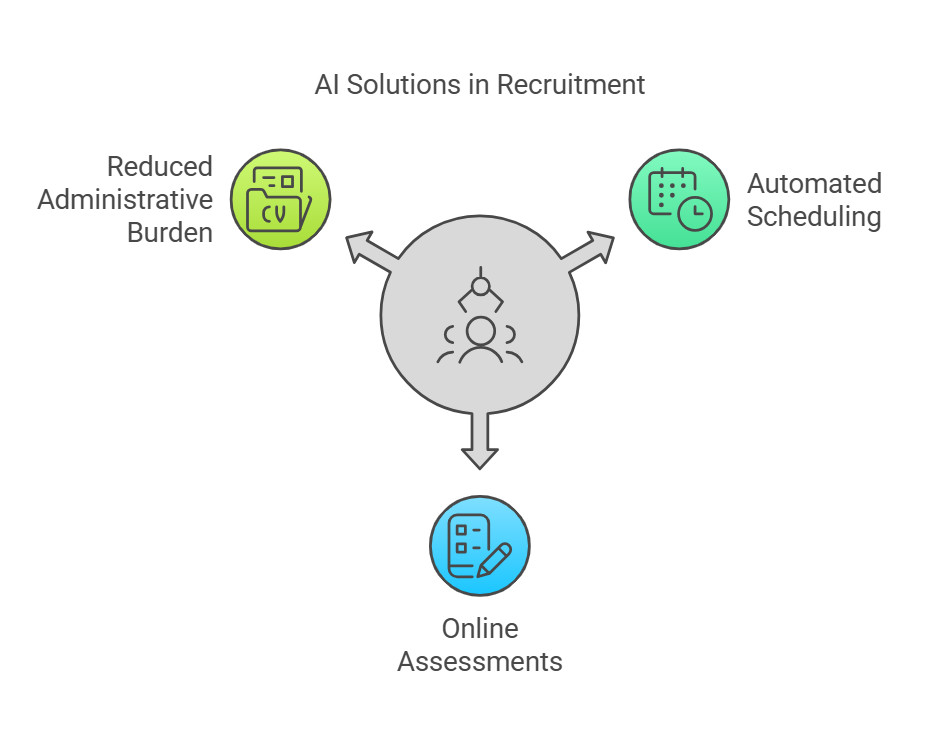
Technological advancements are crossing many industries, and the field of human resources is no exception. Due to the development in the application of Artificial Intelligence in the recruitment process, the overall hiring process has undergone a revolution. Artificial intelligence and Recruiting are like the perfect pair, from the initial stages such as resume screening to the final such as estimating the candidates success. In this article, we will discuss how employers are helped by AI in the recruitment process, ways of minimizing bias, and how employers are aided by the use of AI in the process of hiring talent.
1. The Rise of AI in Recruitment
AI is not just an addition to recruitment to help make work easier but to help make recruitment even better. Recruitment previously had many dull, routine processes which are now performed by Artificial Intelligence and recruiting tools leaving professionals to focus on strategy and connections. In terms of risks AI in the recruitment process also has an advantage in bringing output in the form of data that can help companies to make sound decisions regarding the recruitment processes.
2. How artificial intelligence improves the Recruitment Process

AI in recruitment is providing increased efficiency, accuracy, and effectiveness in regard to the hiring process. The adaptive structures mentioned above allow machines to perform tasks faster and accomplish missions that are hard, if not impossible for a human being to achieve in the same timeframe or even achieve at all.
- Enhanced Efficiency: Recruiting tools and artificial intelligence outcompete the traditional methods of application processing because they are faster.
- Consistency in Evaluation: AI ensures the pre-screening of every applicant to ensure less human involvement and a high degree of reliability in the process of recruitment.
- Data-Driven Insights: Certainly, the application of AI in the recruitment process offers insights for the decision-making by HR throughout the recruitment process.
3. Resume Screening and Shortlisting using Automation
Resume screening is easily one of the most notable applications of AI in recruitment or talent acquisition. Going through resumes by hand is a time-consuming process. However, with AI and contracting tools, resumes can be scanned in a few seconds with possible candidates filtered depending on the set lists and missed potential employees.
- Keyword Matching: AI tools look for certain strings you need to meet in order to be considered in an application process for a particular job.
- Candidate Scoring: AI provides relevance ratings from experience, education, or any other desirable traits or skills and thereafter provides a list of qualified applicants to the recruiter.
- Reduced Time-to-Hire: Through this feature of eliminating the need for a recruiting manager to manually review a pile of resumes, artificial intelligence in the recruitment process saves time resulting in faster accomplishment of the hiring goal.
4. Minimizing and Managing the Problem of Bias in Recruitment
In fact, one of the most unique approaches that AI can address in recruitment is the question of bias. Preconceptions that recruiters may have when hiring can in fact be a problem for the company when practices like diversity and inclusion are considered. However, using AI and various recruitment technologies can solve this problem.
- Objective Screening: AI uses data to assess candidates, it does not take into account issues like gender, age, or ethnicity thus making a recruitment process more equitable.
- Blind Hiring Features: Most of the AI in recruitment process tools remove applicant identity, meaning that the recruiters will only see candidates’ qualifications.
- Enhanced Diversity: By filtering out a certain amount of bias, AI can add to making the teams more diverse, enhance creativity, and make the company culture better.
5. Optimizing Candidate Experience through the use of AI
Employer branding includes strong candidate experiences, and leveraging artificial intelligence and recruiting has proved critical in delivering strong positive experiences. Machine learning and recruiting technologies will help companies convey, communicate with, and otherwise assist candidates on their employment journey.
- Personalized Communication: It can also use AI to send messages to candidates about their opportunity status at certain intervals without complicated chatting.
- Transparent Process: Utilizing AI, candidates are more aware of the process, which decreases the level of suspicion in the process, thus the satisfaction rate will increase.
- Immediate Responses: Automating the collected responses by using AI-driven chatbots helps keep the candidates engaged and always informed in the process.
6. Forecasting Success with AI Predictive Analytics
Recruitment process application is one of the aspects where AI is particularly effective with predictive analytics. AI has the ability to analyze candidate data and prior hiring results and forecast how they will perform in a particular position.
- Performance Predictions: As the case with AI, it relies on data to estimate the probability of a candidate performing well in terms of experience, skills, and organizational culture.
- Reduced Turnover: Organizational use of predictive analytics results in better selection, which ultimately improves retention and lowers turnover.
- Long-Term Success: When it comes to hiring artificial intelligence and recruiting, firms can concentrate on prospects that are most likely to prove profitable in the long term.
7. Streamlining Interview Scheduling and Assessments

Conducting interviews and assessments can be complex and when it comes to setting a time to interview candidates this could be difficult because AI in the recruitment process provides solutions.
- Automated Scheduling: Some AI features help to find the optimal time for an interview and match both candidates and recruiters preferences in order to avoid solving multiple scheduling tasks.
- Online Assessments: Pre-employment online tests and their scoring can be performed by AI, which can provide information on a candidates abilities and personality.
- Reduced Administrative Burden: These tasks’ automation means that artificial intelligence and recruiting tools relieve the recruiters of time-consuming work but leave relation-building responsibility to them.
8. The Role of Chatbots in AI-Driven Recruitment
Chatbots are now a standard part of AI in recruitment. Through the online recruiting system, the chatbot helps candidates apply for the job, provides information, and can set up an interview as well.
- 24/7 Availability: Employing the use of chatbots means that candidates are always attended to at their own convenience to increase efficiency.
- Improved Communication: Through the help of chatbots, candidates are constantly entertained and supported during the different phases of the AI in the recruitment process.
- Data Collection: That way, chatbots collect information regarding candidate interactions to ensure that organizations are always refining their recruitment processes.
9. Building a Data-Driven Recruitment Strategy with AI
AI in recruitment creates raw data that can be used to develop a completely digital recruitment plan. As AI identifies trends, results, and receptiveness in the candidates, the recruiter can enhance his/her strategy.
- Identifying Trends: AI reveals patterns in the candidate behavior, the market, and the success/failure of the hiring process helping businesses manage change successfully.
- Enhanced Workforce Planning: Information leads the Human Resource departments in organizations to make workforce planning forecasts, and know when and who to hire.
- Continuous Improvement: Recruiting tools and artificial intelligence data enable organizations to enhance the recruitment process for increased efficiency.
| Latest Category Jobs | ||
|---|---|---|
| Job Information | Apply Job | |
Client Engineering Ai Engineer(2-6 years) | ||
Conclusion
AI has already taken significant steps in recruitment, and its role in this process is only going to grow because companies have now realized how valuable it is to make recruitment processes data-driven, efficient, and just. Thus, how employers can use artificial intelligence and recruiting tools will help save time avoid bias, and eventually select the right candidates. AI in the recruitment process is beneficial to organizations as it helps them develop better and more effective recruitment plans and develop better candidates and personalities the candidates’ experience. It is clear that as AI technology changes so will the field and its applications in recruitment meaning it is a great resource for companies. For organizations who need more sophisticated recruitment tools, Rozgar.com provides tools for implementing AI recruiting solutions.
Frequently Asked Questions
AI makes recruitment better through a reduction of bias in things such as resume screenings, increased efficiency in handling large numbers of applicants, better experience for applicants, and analysis ability.
Although it can’t completely solve the problem of bias, AI and recruiting tools can greatly minimize the issue by using qualifications as standards.
New tools of AI enhance the candidate experience by delivering personalized, immediate, and more transparent AI communication in recruitment.
AI in recruitment involves a tool known as predictive analytics and involves analyzing data from previous hires, as well as from current candidates, in order to forecast the success of a particular candidate.
Indeed, chatbots make communication less time-consuming, provide instant answers, and help in scheduling, thus being essential parts of AI and recruiting toolkits.



